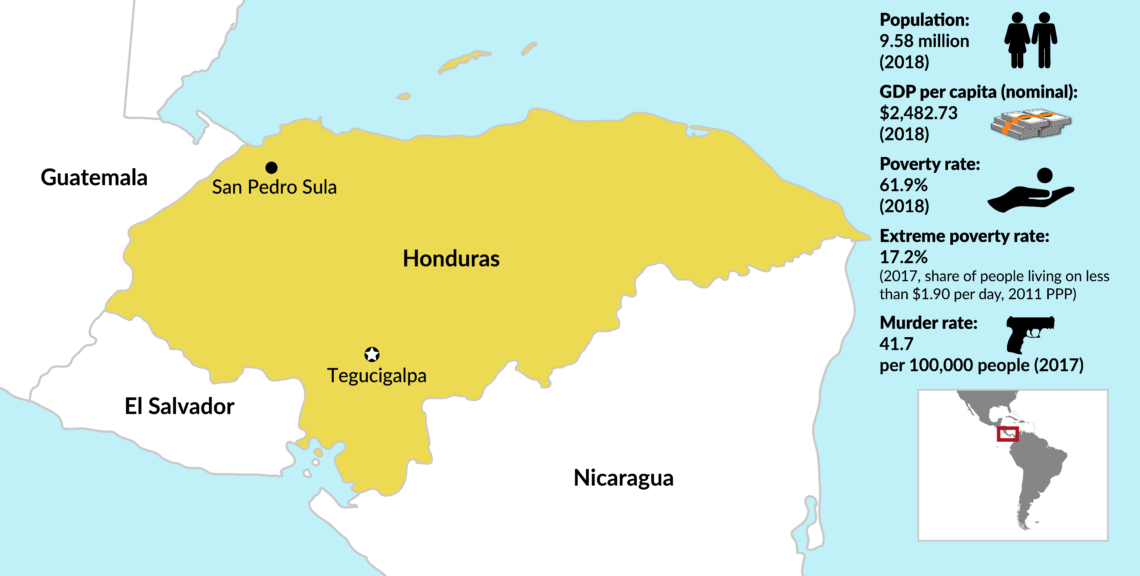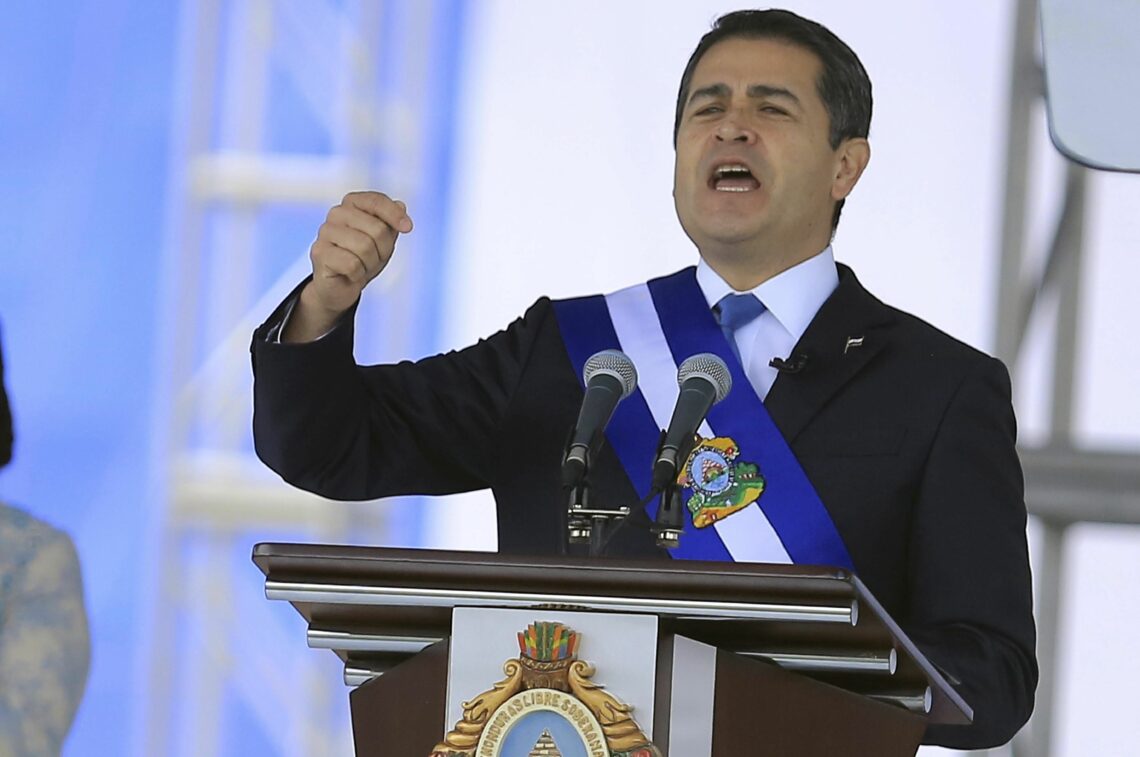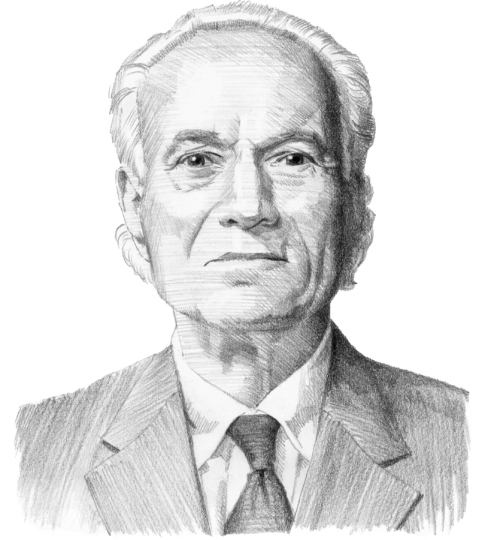Honduras pays the price for being a captured state
Honduras is one of the poorest countries with one of the highest in the world crime rates. With the Trump administration counting the government of Honduras as an ally and the Honduran president enmeshed in drug trafficking, there is little prospect for change.

In a nutshell
- Honduras is plagued by violence and poverty
- Corruption and drug smuggling are at the root of the problem
- The country’s elites use these practices to maintain power
Honduras is one of the three nations, along with El Salvador and Guatemala, that form the Northern Triangle, a subregion of Central America that has sent millions of migrants to the United States in recent years. These countries have drawn the ire of President Donald Trump, whose administration has worked aggressively to stop the flood of immigrants from the south. Its efforts have included threats to cut off U.S. aid aimed at ameliorating the very poverty and violence at the root of the exodus.
Recently, the Trump administration signed “safe third country” agreements with all three Northern Triangle countries. The agreements require asylum seekers from the three nations to first apply in one of these countries before attempting to come to the U.S. Another rule passed by the administration sends asylum seekers to Mexico until they are allowed to return to the U.S. for immigration proceedings. In late November 2019, a Honduran citizen who reportedly requested asylum in the U.S. under the new rules was flown to Guatemala. However, he declined to apply for asylum in that country.
While the conditions that induce migration to the U.S. are broadly similar in the three countries, each has specific issues that distinguish it from the others. A previous GIS Opinion discussed the pervasive corruption in Guatemala. In another, GIS examined the factors surrounding the recent election in El Salvador of a reformer, Nayib Bukele, as president. (He has promised to deal with the violence committed by youth gangs, known as maras, and to stimulate the economy.) This Opinion is devoted to Honduras.
Poverty and violence
Honduras is one of the poorest countries in the hemisphere, with a gross domestic product (GDP) per capita of $2,483 and a Gini coefficient of 0.505. (The ratio measures inequality on a scale from zero, reflecting complete equality, to one for total inequality.) By comparison, Guatemala and El Salvador have per capita incomes of over $4,000 and Gini coefficients below 0.5.
The share of Hondurans living below the national poverty line is nearly 62 percent.
According to World Bank data, the share of Hondurans living below the national poverty line is nearly 62 percent, while those mired in extreme poverty – living on less than $1.90 per day – is 17.2 percent, the highest among the three Northern Triangle countries. The top 10 percent of the population holds nearly 38 percent of the country’s wealth, while the bottom 10 percent hold just 1.1 percent, the largest disparity among the three countries.
The macroeconomic data lead us to the root of Honduras’ problems: It is an extraordinarily poor country dominated by a tiny economic elite. Members of this elite convey control over the state to groups that protect their economic interests but have become enmeshed in criminal enterprises, especially corruption and drug trafficking. The setup produces an extraordinary homicide rate of 42 per 100,000 people, making Honduras one of the most violent countries in the world.
The economic elite is centered in the northern city of San Pedro Sula, which has a murder rate of 47 per 100,000. (In the capital, Tegucigalpa, the figure is 43 per 100,000; Chicago, often described as a violent city, is at 20). The country has one of the hemisphere’s highest shares of homicides committed by organized crime groups, which in the case of Honduras means the maras and drug traffickers.
The northern elite mainly comprises cattle farmers and those associated with the banana estates, most owned by U.S. firms. These rural power brokers are aligned with the industrial (mostly textiles) and financial elite in Tegucigalpa. For decades, these groups alternately worked through the right-wing National Party and the center-left Liberal Party to control the state.
Corrupt leadership
This stability was shattered in 2009, when President Manuel Zelaya, a member of the Liberal Party, tried – in violation of the constitution – to retain power after his term expired. Mr. Zelaya took a populist stance, promising to reform the nation’s politics and declaring that he would turn his party toward the Bolivarian socialism of Venezuelan leader Hugo Chavez. The Honduran congress threw him out and installed their man, Porfirio Lobo. Under President Lobo, both corruption and organized crime flourished.

In 2013, National Party candidate Juan Orlando Hernandez was elected president. He was reelected in 2017, though observers from the Organization of American States (OAS) found widespread irregularities. Despite the evidence of fraud and protests that filled the streets of the capital for weeks, Mr. Hernandez was declared president by the electoral commission and the supreme court.
His government came under international scrutiny when the U.S. arrested the president’s brother, Juan Antonio (Tony) Hernandez for serving as the bagman for a million dollar “contribution” from the Mexican drug cartel led by Joaquin “El Chapo” Guzman, and for conspiring to import tons of cocaine into the U.S. At the trial, a witness testified that he had seen El Chapo hand the money to Tony and that the cartel had long-standing contacts with the government in Tegucigalpa.
Devis Leonel Rivera, a founder of Honduras’s most extensive drug trafficking and criminal organization, Los Cachiros, also testified in Tony Hernandez’s trial. When confronted with the damning testimony, President Hernandez claimed the witnesses were lying and pointed to his antidrug policy and his cooperation with the country’s National Anti-Corruption Council.
Some efforts to battle corruption have been successful, however. The wife of former President Lobo was convicted of “undue appropriation of funds and fraud” after an investigation found she had misused hundreds of thousands of dollars designated for social programs. Moreover, the OAS was allowed to help create a commission against corruption and impunity (MACCIH by its initials in Spanish), which continues its work in a dogged, if modest, fashion to expose state-sponsored violence and criminal activity.
U.S. ally
In a recent GIS report, Stefan Hedlund described the situation of another captured state, Moldova. There, a combination of national and international actors succeeded in recapturing the state from a clique of oligarchs. Honduras is different: the perpetrators are not as easy to identify as the powerful oligarchs in Moldova or Russia. The situation in Honduras is also unlike Moldova’s in that the external actors are neither unified nor willing to play a significant role in clawing back the Honduran state from its corrupt leaders.
The most important external actor, the United States, is not pushing the current government to clean up its act.
The most important external actor, the U.S., is not pushing the current government to clean up its act. Washington has declared repeatedly that Honduras is a cooperating ally in dealing with illegal immigration, which the Trump administration considers the most critical issue in its relations with Latin America.
The case against Tony Hernandez in U.S. courts has shined a light on the links between political corruption and drug trafficking in Honduras. It has also implicated the president and his closest allies in illegal activity. Yet none of this has had an impact on official U.S. policy.
As long as the Trump administration prefers to work with President Hernandez, little can be done to take the state back from his coterie in the National Party. The group appears willing to allow state-sponsored violence and rampant corruption as the price of holding onto power. In his budget for 2020, President Hernandez cut social spending by 15 percent and increased the budgets of the military and police.








